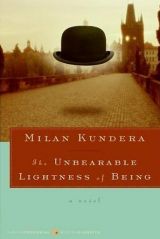


|
The Unbearable Lightness of Being: A Novel (Perennial Classics) (平装)
by Milan Kundera
| Category:
Fiction |
| Market price: ¥ 158.00
MSL price:
¥ 148.00
[ Shop incentives ]
|
| Stock:
Pre-order item, lead time 3-7 weeks upon payment [ COD term does not apply to pre-order items ] |
MSL rating:
 Good for Gifts Good for Gifts |
| MSL Pointer Review:
Beautifully written and heartrendingly compelling, this work is an exquisite human journey of self-discovery. |
| If you want us to help you with the right titles you're looking for, or to make reading recommendations based on your needs, please contact our consultants. |

|
| |
AllReviews |
  1 2 Total 2 pages 13 items 1 2 Total 2 pages 13 items |
|
|
Sandra Oziqbo (MSL quote), USA
<2007-01-09 00:00>
Being my first but certainly not my last Kundera novel, The Unbearable Lightness of Being, exposed a great power of language; its ability to effortlessly move the reader. Kundera's novel holds meaning on three levels: the historical, the philosophical, and the romanctic. The intellectual reader and the everyday simpleton (of which category I shamelessly fall into) can both extract something valuable from this mature work of fiction. There are the philosophical connections as Kundera dives into Nietzche's philosophy on eternal return or offers a German adage or an application of "kitsch". For those that might not completely grasp these concepts, Kundera writes in a third person omniscient style that allows hims to both stick to the the story line of Tomas, Tereza, Sabina, Franz, and Karenin but also go off on retrospective tangents.
Even by setting his novel in a Communist run Czech, Kundera succeeds in creating a timeless piece but fails to make it feel "autonomous": independent of any system of political beilef, because the lives of the characters are so affected and shaped by what is happening in their world. As the love story progresses, the reader finds so many symbols and questions for instance, about jealousy, the body and the soul, nakedness, misunderstood words, and dreams. Kundera plays with these ambiguious structures of signs to show the innate essence of human existence.
By far, I was moved by the realistic portrayal of human weaknesses and faults through his intertwined love stories. Not your typical "boy meets girl, they date, they marry, they work and have kids, and then ultimately die" love story, Tomas's scandolous affairs, Tereza's insecurites, Sabina's never ending betrayals, and so on keep the plot interesting. Man versus Man, Man vs. Himself, and Man vs. Animal are all themes that come together through Kundera's humor, skepticism, and fundamental pessimism. Warning at times the novel got heavy and depressing, but Kundera's vivid imagery and subtle injections of light and reflection created a perfect balance of meaning.
I would recommend this novel to anyone who wants "art for the sake of art". Anyone who truly wants to be moved into self-reflection and wants to take a journey through Kundera's infinite ways of interpereting the presented facts. The story doesn't hold a lot of suspense and action but is like a slow long walk that the reader never wants to end. This novel conveys an experience that is almost untangible as well as indescribable because Kundera dishes it in a way that each person must accommodate the meaning into their own existing schemas. Far from unbearable, this novel is sensual, reflective, and indeniably honest about the most essential themes concerning Man; motivation, purpose, and love. |
|
|
Roger Brunyate (MSL quote), USA
<2007-01-09 00:00>
What a magnificent piece of writing! Twenty years ago, I saw the movie and enjoyed it greatly. I remember a bittersweet love story set against the Russian invasion of Prague, an intense eroticism, and a haunting use of Janacek piano music. All these qualities are indeed found in the novel, but the movie is two-dimensional by comparison, able to do little more than hint at the richness of Kundera's thought, his unusual narrative structure, and his extraordinary use of the fourth dimension, time.
This is indeed a musical book, though its inspiration seems to be the kaleidoscopic style of the late Beethoven quartets, which mingle profundity with earthy humor. It consists of a number of separate movements, all covering much the same material, but from many different points of view. The story as such is almost irrelevant; all that is important in it has been told well before the half-way point. It is like having conversations with a number of friends, catching up with the doings of mutual acquaintances, but also talking about philosophy, politics, sexuality, and religion. Like all good conversations, each discussion is both stimulating and reassuringly familiar.
I don't know if this is conscious on Kundera's part, but he also seems to owe a strong debt to Voltaire's Candide, in that the leading characters, after a life of sometimes violent political and erotic adventures, ultimately settle down to make their gardens grow. It makes for a touching ending, and a deeply satisfying one. |
|
|
Sai Li (MSL quote), USA
<2007-01-09 00:00>
This was a dull and very unimpressive book. Maybe I just don't appreciate high-art and metaphysical intrigue, but if you're like me and hate reading about existential crises and post-modernist ramblings for fun, then skip this one for your own good. If you're one of those people who can't appreciate Picasso's Cubist paintings, you'll be just as frustrated with this book. Plus underneath it all, it's just another harlequin romance (about a woman trying to find her ideal lover). If you really want to get your brains going in circles without all the pretentiousness, try Sartre's Nausea or Camus's The Stranger. |
|
|
|
  1 2 Total 2 pages 13 items 1 2 Total 2 pages 13 items |
|
|
|
|
|
|